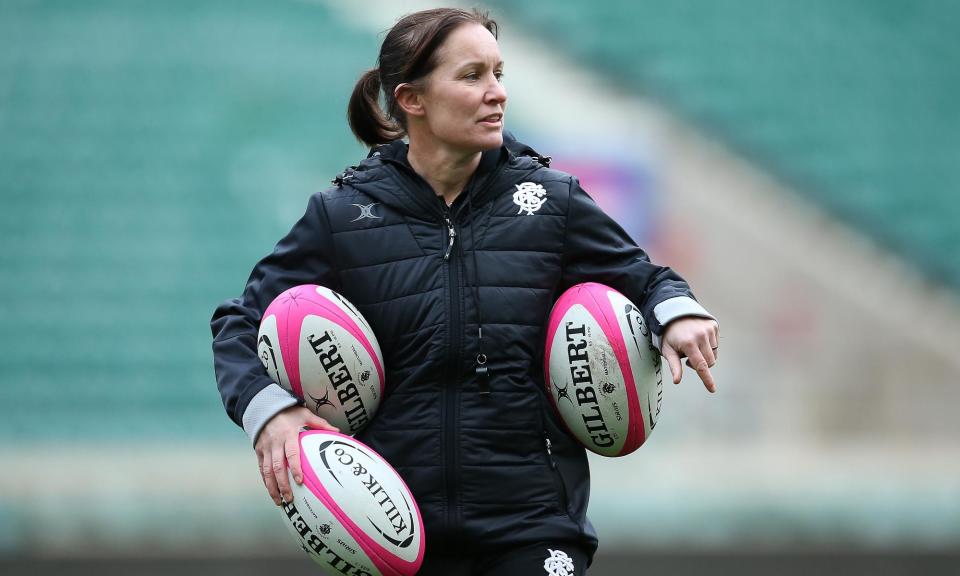
Good news was in short supply in Australian rugby union in 2023. A humiliating early exit from the men’s World Cup was merely a symptom of a wider malaise. Across what was surely the worst year in Wallabies history, two head coaches left their post in ignominy, a young talent touted as the future of the code abandoned ship for rugby league, and 100-cap veterans were tossed aside like leftover meat.
Thankfully this is just one side of the story. Flip the page over and you’ll find a more hopeful narrative to follow.
Related: Rugby Australia won’t rule out hiring Michael Cheika for second stint as Wallabies coach
“The potential is through the roof,” says Joanne Yapp, the former England women’s scrumhalf and captain who was named as the new Wallaroos head coach at the start of the month. It is a landmark moment for Australian sport as she becomes the first woman to take control of a senior national football team in the country.
“It’s a great honour,” she adds from her home in Shropshire in England’s West Midlands where she’s based until her move to Sydney in early February. “I’m just really excited. There is loads of room for development in the programme. There haven’t been full-time coaches in place before so that really excites me.
“Being the first woman in the role is great, and it’s a great talking point for the sport, but it’s not something that I focus on. I’m just focused on taking this team to the next level.”
Yapp, who represented England across 70 matches including at three World Cups, has been coaching ever since her retirement in 2009 when she worked with the national Under-20s programme. In 2019, she was appointed director of rugby at Worcester Warriors, where she’d played all her career, and held the post until the club folded in February.
“I think that experience will help me moving forward,” she says of a dramatic period in English rugby that also saw London Irish and Wasps fall into administration. “It was a really challenging time. It taught me the importance of building trust with players and seeing them as people first.
“I had to manage in ways I didn’t expect. It showed me what my values are and what is important. It helped me understand the process of making difficult decisions.”
These are encouraging words for Wallaroos players and fans who have watched their team bump up against a glass ceiling. A group of mostly amateurs, with a few professionals from the successful sevens programme, have punched above their weight on the world stage.
A commendable second-round exit at the World Cup in 2022 was followed by an impressive third-place finish in the inaugural WXV tournament this year. But a chasm still exists between the Aussies and the heavy hitters above them.
“They showed that they can compete with the best by beating France,” Yapp says, referencing October’s 29-20 win over the third-ranked team in the world.
“What’s needed now is consistency. The Super W [an equivalent of the men’s Super Rugby competition] has helped develop players, and the clubs have really started to deliver a competitive league to drive their game. So we’re tracking in the right direction. I’m confident we can close the gap on England and New Zealand.”
There is no promise of silverware just yet. The next World Cup will take place in England in 2025. Four years after that the show will move to Australia. By then, Yapp says, all Wallaroos players will be standing on a foundation of a fully professional programme and harbouring aspirations for major trophies.
Yapp was impressed with the performance of the Wallaroos pack – traditionally a weak point – in the WXV. And though she accepts that depth and experience are two key areas that need attention – only three players in the most recent squad have more than 20 caps – she has seen enough talent coming through to be confident of an upturn. However, she is asking for patience.
“It’s going to take time,” she cautions. “The teams above us are far ahead in their development. They’ve been professional for a generation and have stronger leagues. We have the raw materials. But it won’t happen immediately.”
Yapp says that she is determined to understand what she calls “the ‘why’ within the group”. As in, why have these women chosen rugby? What is it they’re playing for? What is motivating them to reach heights untouched by previous generations?
Related: The Breakdown | Champions Cup emerges from rugby’s recent darkness to offer shafts of light
The Wallaroos’ close connection with First Nations people, evidenced by the many specially designed kits honouring Australia’s pre-colonial cultures, serves as a drumbeat for the side.
“I’m not fully aware of it all but I’m excited to learn more,” Yapp says. “For me, that shows that this is a group that recognises its importance. It has a reason beyond what happens on the field to pull on the jersey, to work hard in training, to sacrifice for their country. That is so important.”
Yapp is certainly saying all the right things. If she can back that up with results on the pitch, she may yet write a more optimistic chapter in the tale of Australian rugby.
Article courtesy of
Source link